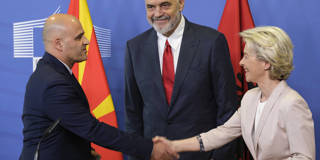The European Union’s undeniable success in advancing regional integration does not make it a finished project. As threats to global stability increase, the EU must continue to pursue its strategic interests, as well as attend to the European ambitions and prospects of all the countries in its immediate neighborhood.
MADRID – Global stability is a fragile asset, as the war in Ukraine and heightened tensions over Taiwan have recently shown. In a world that is tearing itself apart, the European Union should make trust in the European project a top strategic priority. Against the backdrop of unfulfilled EU membership aspirations, other powers could exploit citizens’ frustration – as we are now seeing in the Western Balkans, where Russia is seeking to reassert its influence. More than ever, the Union must demonstrate that it is a useful and reliable partner for all European countries, regardless of their formal relationship with the EU.
The present is a period of paradox for Europe. Despite a succession of severe convulsions, European integration has recently undergone a historic acceleration. Since the COVID-19 pandemic hit Europe two and a half years ago, practically all of the EU’s decisions have sought to strengthen member states’ political integration.
Historically, the success of European integration has created the possibility, as well as the challenge, of enlarging the Union to include new members. The EU must continue to integrate, knowing that its vocation extends to the entire European continent. But, to guarantee its continuity, the EU will have to offer accession candidates new forms of participation that help to foster a feeling of belonging to the European project.

MADRID – Global stability is a fragile asset, as the war in Ukraine and heightened tensions over Taiwan have recently shown. In a world that is tearing itself apart, the European Union should make trust in the European project a top strategic priority. Against the backdrop of unfulfilled EU membership aspirations, other powers could exploit citizens’ frustration – as we are now seeing in the Western Balkans, where Russia is seeking to reassert its influence. More than ever, the Union must demonstrate that it is a useful and reliable partner for all European countries, regardless of their formal relationship with the EU.
The present is a period of paradox for Europe. Despite a succession of severe convulsions, European integration has recently undergone a historic acceleration. Since the COVID-19 pandemic hit Europe two and a half years ago, practically all of the EU’s decisions have sought to strengthen member states’ political integration.
Historically, the success of European integration has created the possibility, as well as the challenge, of enlarging the Union to include new members. The EU must continue to integrate, knowing that its vocation extends to the entire European continent. But, to guarantee its continuity, the EU will have to offer accession candidates new forms of participation that help to foster a feeling of belonging to the European project.